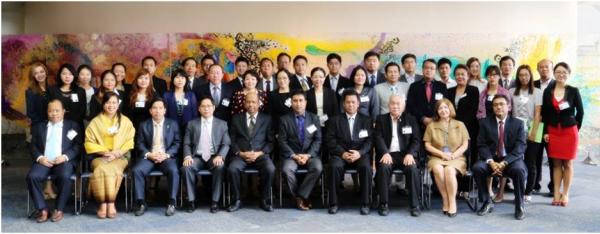One of the major issues faced by the CLMV countries (Cambodia, Laos, Myanmar and Vietnam) hindering narrowing of development gaps and economic integration into AEC is the limited public human resource capacities and institutional support systems to develop and implement SME and trade and investment policy and regulatory frameworks. Capacity building of these institutions is necessary to ensure that they are competitive, innovative and are able to utilize the regional economic initiatives and incentives to provide effective services for the SMEs survival and growth. The necessity stems from the fact that increasing exports by SMEs is an important means to drive the national economic performance and growth.
With this background, the Mekong Institute, in collaboration with UNESCAP, conducted the “Regional Multi Stakeholders Forum on ASEAN Economic Community (AEC) and Regional Agreements: Opportunities and Challenges for SMEs” in United Nations Conference Centre (UNCC) in Bangkok, Thailand on October 10, 2014. The forum was part of the three-year project on “Integrating the CLMV economies into AEC” with the support from New Zealand Aid Programme (NZAP).
Eight experts from ESCAP, ADB, MI, GMS Business Forum and CUTS-Hanoi joined in panel discussions to address the impact of AEC on SMEs in the CLMV countries to identify ways and means for understanding the opportunities and challenges of AEC and other FTAs.
While sixteen senior level officials representing Ministry of Trade, Industry and Commerce, Ministry of Planning and Investment, and Chamber of Commerce and Industries (CCIs), SME Associations and leading enterprises from CLMV countries shared views to a) prioritize capacity building needs for SME development and trade in each country and b) identify the role of CCIs, BAs, Government departments and research institutes for enhancing the SMEs’ participation for utilization of trade concessions available through these FTAs. ESCAP and MI introduced the researches and projects to support SME and trade development implemented in the region.
The forum put forwarded specific recommendations for the policy makers of the CLMV countries:
The stronger sense of AEC needs to be built up among CLMV and other ASEAN countries. The effort can start from educating students in national educational institutions to encouraging officials to participate in and implement the regional professional capacity building programs on AEC integration.A more effective mechanism linking research institutions, governments and private sectors is required while policy makers setting up legal framework for SME development. Such mechanism should make sure that the research results to be applied, the needs of the private sector to be heard and the right policy to be made. Instead of urging SMEs to be aware of challenges of AEC, the three players need to work closely to provide more practical guidance helping local SMEs sizing opportunities of AEC. While facing AEC, the local government should identify certain industries based on researches, and highlight the investment profiles for investors. It is necessary for government to adopt the role as facilitator to link investors with local enterprises, research and education institutions. Such linkage will minimize or solve the difficulties faced by local SMEs in terms of finance, technology, management and trained skilled workers etc., which will eventually benefit the local SMEs widely integrating into the global and regional value chain.Government should collaborate closely with research institutions and CCIs to provide accurate and intensive trade and investment information for local enterprises and foreign investors. It is curtail for all countries to develop online database and information hub to make sure the key business information and data to be easily accessed. After taking part in the regional capacity programs, government agents, CCIs and BAs are encouraged to take the ownership of the existing outputs of regional researches and programs and continually place it in ground to receive long-term impact and benefit.The forum concluded with the note for active collaboration among the stakeholders to provide necessary support through demand driven capacity building programs.








